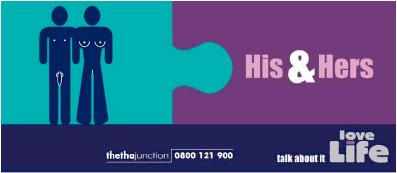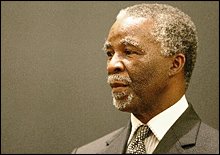Am currently gathering HIV awareness/prevention material so I can prepare a presentation to deliver to a group of teenagers in 3 months' time. Not sure how well it (the presentation) will serve them, ‘cause even with everything I know about HIV and AIDS I still can’t claim to be 100% safe (i.e. I do very well at abstinence, and then one day, when the hormones, the stars and the wind are aligned just right… all my efforts go out the window, I’m shot off the pedestal back into the primordial slime… may tell the story of that struggle some day soon).
But back to information gathering…
First stop today was lovelife South Africa where I got high-res versions of the TV PSAs. They’re mandated to spread the HIV-prevention gospel to South Africa's youth, so they use some pretty hip billboards and PSAs… the sort that some of us “non-youth” wouldn’t get right away… or ever! As a result, they are constantly under fire from parents, churches, community groups, etc. who feel good money is being wasted on adverts on billboards and primetime PSAs, and teaching teens promiscuity (safer sex methods) when they could be … I don’t know… putting it into the community somehow. Lovelife is truly where the rubber meets the road in the condomize vs. abstain debate (pun intended).
They do the most interesting and abstract billboards, kinda like those Magic Eye pictures… you have to see it a few times, stare at it from just the right angle, and then one day (if you have the kind of mind that “sees” 3D… mine has never figured those pics out), while you’re rescuing yet another meal from burning to a crisp, or placidly ironing your laundry, the light bulb will go off. And you’ll think, “that’s what that means!” This happened to me a few years ago… when they had the ‘his&hers’ billboard campaign (sure you’ll probably figure it out in a minute… hmm… let me know if you do, ok?).

Lovelife’s advertising campaign is so good, you can do research on it, as seen in this appropriately titled document, The struggle for meaning: a semiotic analysis of interpretations of the lovelife his&hers billboard campaign.
They came under fire early this year because of a billboard that said "HIV loves pelegi go supa bosadi [HIV loves the notion that child-bearing proves womanhood]".

Enough people caused enough of a stink to force them to take the billboards down. The message referred to a practice around here where young girls feel they have to prove their womanhood by giving birth to a child(ren) (and yes, I’ve always wanted to write “a children”). The billboards came down ostensibly because they were stigmatizing pregnancy. [I heard somewhere that it was an 'unofficial' policy back in the days of the struggle to make sure any girl above 16 had a child or children. Of course, like the slogan “freedom today, degrees tomorrow”, no one admits to its existence and though official evidence of it has been washed away by the demands of a civilized democracy and the most liberal constitution in the world, the unofficial evidence remains].
Starting early this year they launched a pretty hard-hitting TV PSA campaign with the tagline “HIV, Face It”. The first one I watched not only caused the rise of goosebumps of fear all over my body, but also scattered in the four winds, any lust that may have been lurking in the shadows of my mind, body or soul ... putting me right back on that pedestal (to await, again, that proper alignment…). Take a look at it... what scares me is the part where the voice over guy says "HIV Wants You!" which is where I picture an uncle sam (or uncle hiv in this case) pointing and looking directly at me, and I can't look away because I am guilty of something.
The ones that followed have been as hard-hitting… and progressively sadder because they show you the cycle and what happens after you give in to your all-too-human desires. This is even tougher to watch because everyday on this continent there are hundreds (from all walks of life) having to “Face It”. And even more of us who are steeling ourselves with profuse prayer and supplication to the gods, the ancestors, and fate, as we prepare to go in for that test.
One last thought on things magical, check out the unharnessed power of school uniforms in this article.
Second stop was the office of a colleague who teaches in high school, and he has adapted this (Rice, G.H. (1995). AIDS in sub-Saharan Africa: A diffusion model. Journal of Geography, 1 (94), 317-322 Rice, G. H. (1994). The global AIDS pandemic: A diffusion simulation. Teaching Geography , 3 (19), 124-126) really neat illustration of how HIV spreads, to the South African context. He teaches IT among other subjects and had a copy of the activity in the computer room. As he opened the door, he read the sign posted on the door and rolled his eyes. He had put up a notice that said “Unfortunately the internet is down until further notice. Sorry guys.” And some clever kid had turned the ‘u’ in guys into an ‘a’ (which he is)… kids… never miss an opportunity to be smart alecs.
But let me start at the beginning: I drive up to the boom gates infront of the school (located in leafy suburbia) and tell the guards manning the booms that I’m here to see so-and-so. They ask: "is he at the school or at the market?" And I’m thinking: “market???” I drive into the school compound and sure enough there’s a flea-market looking place complete with stalls and people packing up their wares, mostly food wares. I walk around the stalls, totally jazzed that a market and a school can coexist in the same compound. When I asked my colleague he said it’s the organic market, open every week day, serves Jobergers who are obsessed with interested in things organic, and that it never interferes with classes ‘cause the kids are pretty disciplined (plus quite a number of their parents have stalls there).
I found the whole concept, a school that knows how to make money off renting bits of its property, intriguing so I pressed him for more details about the school:
It goes from kindergarten (or crèche/grade nought) to high school - grade 10, the kids don’t wear uniform; they have to play at least one musical instrument. Class size is a maximum of 30 students, and they go from class one to grade 10 as the original group of 30. They have one main teacher who looks after them from class one to class seven, and are then handed over to another teacher who sees them through to grade 10. The first teacher will also keep an eye on them and continue to be part of their lives until they leave the school. Of course life happens along the way, but these are the guiding principles. High school kids pay the low low 'special only' rate of R40,000 a year (lower grades pay less), and the kids go on to university and to a diverse range of careers.
It’s the Waldorf approach to learning and no, you dare not breathe a word about the competition, Montessori, around there. I think both are really good learning methods, though I'm more familiar with the Montessori approach 'cause all the amazing puzzle-whiz kids I've met come from Montessori schools... maybe I can get something to try on the know-it-all teens from here ...





